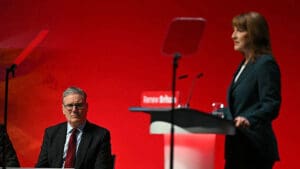
Chancellor Rachel Reeves has abandoned plans to raise income tax in this month’s Budget, backing away from what would have been a dramatic break with Labour’s manifesto pledge after warnings it risked sparking a backlash among MPs and voters.
According to officials briefed on the decision, Reeves and Prime Minister Sir Keir Starmer have “ripped up” the proposal, which had been included in the Chancellor’s initial submission of “major measures” to the Office for Budget Responsibility earlier this month. The U-turn, first reported by the Financial Times, was communicated to the OBR only this week.
Reeves had appeared to signal an income tax rise at a press conference last week, fuelling speculation that Labour was preparing to raise both the basic and higher rates. However, concerns that such a move would anger already restless backbenchers — and alienate voters facing rising living costs — prompted a rapid rethink.
Instead of a single high-profile tax rise, Reeves is now expected to pursue what Treasury insiders describe as a “smorgasbord” approach: a series of narrowly targeted tax measures designed to raise the £30 billion needed to fill the gap in the public finances. Options likely to feature include a new gambling levy and increased taxes on high-value properties.
The Chancellor is also under pressure after ditching a separate multibillion-pound plan to impose a charge on professionals who use limited liability partnerships, such as lawyers and accountants. Reeves had hoped a new levy would raise around £2 billion a year, but Treasury modelling suggested it could ultimately cost the government money, as firms would accelerate profit declarations to avoid the new charge. “Rachel decided it just isn’t worth it,” one official said.
There is further uncertainty around proposals for a new “settling-up charge” — an exit tax of up to 20 per cent on assets left in the UK by wealthy individuals who relocate to low-tax jurisdictions. Some officials now believe the measure may be dropped entirely amid concerns it could damage investment, particularly in sectors such as artificial intelligence and technology.
Reeves had previously weighed up a 2p rise in income tax coupled with a 2p cut in national insurance, a move intended to shift the tax burden away from workers and onto pensioners and landlords. Economists estimated the change could raise more than £6 billion, but the political cost appears to have outweighed the revenue gain.
She is, however, still expected to extend the freeze on income tax thresholds — a policy effectively operating as a stealth tax. Analysis by the Institute for Fiscal Studies shows that prolonging the freeze until 2030 would pull 10.1 million people into higher-rate tax bands, raising £8.3 billion for the Treasury but dragging 790,000 additional earners into the higher-rate bracket and forcing millions of pensioners to pay tax on their state pension for the first time.
The retreat on income tax also follows intense lobbying from the City and professional services firms over the LLP charge, as well as warnings that too many large, one-off tax shocks risk undermining economic confidence at a critical moment.
Reeves has insisted that “national interest must come before political expediency” and that “we will all have to contribute”, but within government there is growing acknowledgement that the Budget must balance fairness with political realism — particularly after a decade of stagnant living standards.
Culture Secretary Lisa Nandy defended the Chancellor’s approach, saying Reeves would make “the fairest possible choices” to grow the economy and “ease the pain” households have faced over the past 15 years.
“When the Budget is set out on November 26,” she said, “we will make sure those with the broadest shoulders bear the greatest burden.”
With less than two weeks to go, Reeves now faces a narrowing set of options as she attempts to design a Budget that stabilises public finances without sparking a political revolt.
Read more:
Rachel Reeves abandons income tax rise as backlash forces major budget rethink


























